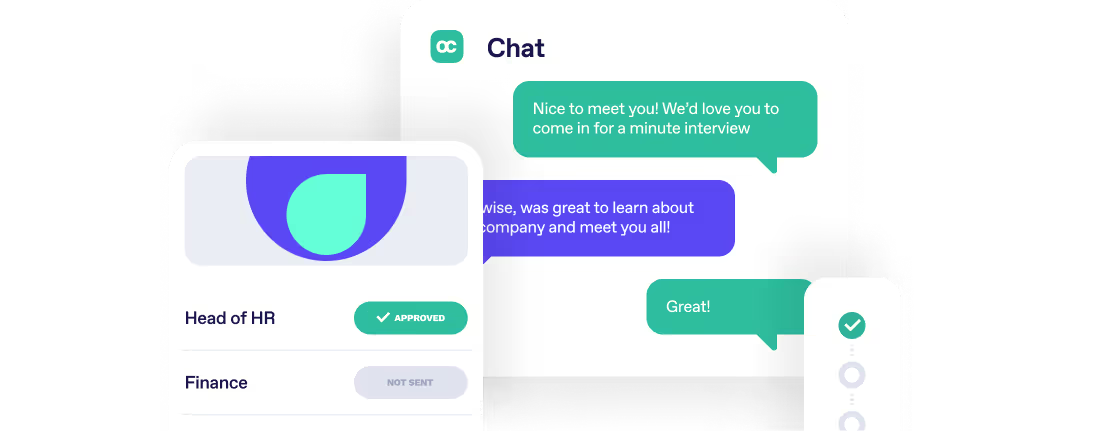How to Ensure Recruitment and Onboarding Have a Positive Impact



According to B2B Assets, an in-depth onboarding process improves worker retention by 82%, proving that your recruiting and onboarding processes should be refined to ensure you’re retaining the top-quality talent within your staff. Onboarding processes not only facilitate the acquisition of talent but also set the tone for the employee's journey within the company. Effective recruitment and onboarding strategies can lead to higher employee satisfaction, productivity, and retention rates. In this article, we'll delve into practical ways to optimise these processes for maximum impact.
How to Create an Engaging Recruitment Experience
How to Write a Job Description
The candidate's journey begins with understanding what are job descriptions and crafting a winning job description is crucial as it serves as the initial point of contact between the company and potential candidates. In today's digital age, leveraging various platforms and channels to reach a diverse pool of candidates is essential. Social media platforms like LinkedIn, Twitter, and professional networking groups offer excellent opportunities to showcase job openings and interact with potential candidates.
Employers also have to think a little deeper and incorporating multimedia elements such as videos, employee testimonials, and virtual tours of the workplace can provide candidates with a more immersive experience and give them a glimpse into the company culture. Highlighting the company's unique selling points, benefits, and growth opportunities can also help attract top talent.

Adapting what is the recruitment process to accommodate remote recruiting and onboarding, especially for distributed HR teams, is vital. As more and more HR teams these days are distributed its important your organisation is set up for remote recruiting and onboarding, adapting more traditional methods to suit a virtual environment. Utilising video conferencing tools for interviews, virtual job fairs, and online assessments can help maintain a seamless recruitment process regardless of geographical constraints. Providing clear communication and timely updates throughout the remote recruitment process can help candidates feel valued and engaged, despite not being physically present.
Employer Branding
Employer branding plays a significant role in attracting top talent. Candidates are not only interested in the job itself but also in the company culture, values, and reputation. Highlighting these aspects through various channels such as social media, company website, Glassdooor and employee testimonials can significantly enhance employer branding and make the recruitment process more appealing to potential candidates.
What is Onboarding and how do you get it right?
Allocating resources to the onboarding process is equally crucial as investing in recruitment. Successful onboarding yields significant positive effects on both financial and operational performance. Establishing formal onboarding practices, alongside consistent communication among HR, managers, and new employees, is essential for integrating employees effectively and achieving a faster return on investment (ROI).
Pre-boarding Activities
The onboarding process should ideally begin before the employee's start date. Providing necessary paperwork, access to company resources, and a warm welcome message can set the stage for a smooth transition into the organisation. Assigning a buddy or mentor to guide new hires can also help alleviate any initial apprehensions and foster a sense of belonging from day one.

Support and Training
Offering comprehensive support and training is essential for new employees to quickly adapt to their roles and become productive members of the team. This could include orientation sessions, job-specific training, and ongoing support from managers and colleagues. Investing in employee development not only benefits the individual but also contributes to the overall success of the organisation. Its also important that
Why is Team Building Important in Integrating Company Culture and Values
Attracting the Right Candidates
Aligning recruitment efforts with the company's culture and values can attract candidates who are not only qualified for the job but also resonate with the company's mission and vision. Incorporating elements of company culture into job descriptions and interviews can help candidates assess their fit within the organisation, resulting in better long-term retention and job satisfaction.
Integrating New Hires into Their Roles
Once hired, integrating new employees into their roles involves more than just assigning tasks. It requires providing opportunities for them to understand the company's mission, values, and expectations. Encouraging open communication, setting clear goals, and providing regular feedback are essential components of a successful integration process.

Evaluating Current Recruitment and Onboarding Processes
Encourage Feedback
Feedback from both candidates and employees is invaluable in identifying areas for improvement in the recruitment and onboarding processes. Encouraging open and honest feedback through surveys, one-on-one meetings, or anonymous suggestion boxes can provide valuable insights into what is working well and where adjustments are needed.
INSERT-cta
Analysing Data
Data analysis can provide valuable insights into the effectiveness of recruitment and onboarding efforts. Tracking metrics such as time-to-hire, retention rates, and employee satisfaction scores can help identify trends and areas for improvement. Leveraging recruitment software like Occupop can streamline data collection and analysis, enabling organisations to make informed decisions to enhance their recruitment and onboarding processes.
In conclusion, it is important to prioritise recruitment and onboarding processes and implementing strategies to improve them can have a significant impact on an organisation's success. By focusing on engaging candidates, designing effective onboarding experiences, and integrating company culture and values throughout, businesses can attract and retain top talent while fostering a positive work environment for all employees.
Summary Points
Enhancing Recruitment and Onboarding for Organisational Success
- Impact of Onboarding on Retention: An effective onboarding process can boost worker retention by 82%, underscoring the importance of refining both recruitment and onboarding to keep top talent.
- Creating an Engaging Recruitment Experience: Crafting detailed job descriptions, utilizing multimedia elements for an immersive experience, and adapting to remote recruiting practices are key strategies to attract qualified candidates.
- The Role of Employer Branding: A strong employer brand that highlights company culture, values, and benefits attracts top talent and enhances the recruitment appeal.
- Effective Onboarding Strategies: Formal onboarding practices, pre-boarding activities, and comprehensive support and training are crucial for new employees' integration and productivity.
- Continuous Improvement through Feedback and Data Analysis: Soliciting feedback from candidates and employees and analysing recruitment data are vital for identifying areas of improvement and optimising recruitment and onboarding processes.
Simple. Beautiful.
Recruitment Software.
HR updates sent straight to your inbox
You might also like...


Manage your entire hiring process simply, from engagement to management, hiring and onboarding







Simple. Beautiful.
Recruitment Software.
Recruitment Software.






